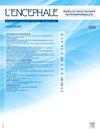Mindfulness-based relapse prevention for cannabis regular users: Finally outcomes of a randomized clinical trial
IF 1
4区 医学
Q4 NEUROSCIENCES
Encephale-Revue De Psychiatrie Clinique Biologique et Therapeutique
Pub Date : 2025-02-07
DOI:10.1016/j.encep.2024.11.014
引用次数: 0
Abstract
Background
Cannabis is the most widely used drug in the world, and the therapies proposed to help withdrawal are moderately effective. The MACBETH project is a pilot study in France. It evaluates the effectiveness of the mindfulness-based relapse prevention (MBRP) protocol for active cannabis users.
Methods
It comprises of two groups, an MBRP group and a Treatment As Usual (TAU) group, each with twenty participants. The primary endpoint reflects the frequency of cannabis use, and some secondary endpoints were evaluated (signs of withdrawal, adherence to treatment, and changes in consumption).
Results
We found no significant difference between the two groups on the primary and secondary endpoints. We found one significant difference in the MBRP group by further analysis for treatment adherence via an indirect criterion, the attendance at all sessions (P-value = 0.01). The number of units consumed from week 1 to week 8 significantly differed in the MBRP group (P-value < 0.05) but not in the TAU group. The average number of units consumed from week 8 to 12 increased by 1.5 in the MBRP group compared with 3.4 in the TAU group. The MBRP protocol appears to be at least as effective as the TAU protocol on the assessed criteria, and the results seem to be more durable, although not significant (P-value = 0.2).
Conclusions
The MBRP protocol shows interesting results compared to TAU in this major public health problem. Further studies could deepen this field of research, especially by following samples over the long-term and measuring cravings. The MBRP protocol is proving to be an effective and serious alternative psychotherapy to drug therapies in the world of addiction.
基于正念的复发预防大麻经常使用者:随机临床试验的最终结果。
背景:大麻是世界上使用最广泛的药物,建议的治疗方法是中等有效的戒断。麦克白项目是法国的一项试点研究。它评估了基于正念的复发预防(MBRP)协议对活跃大麻使用者的有效性。方法:分为MBRP组和照常治疗(TAU)组,每组20人。主要终点反映了大麻使用的频率,并评估了一些次要终点(戒断症状、坚持治疗和消费变化)。结果:我们发现两组在主要和次要终点上无显著差异。通过对治疗依从性的进一步分析,我们发现MBRP组有一个显著差异,通过一个间接标准,所有疗程的出勤率(p值=0.01)。从第1周到第8周,MBRP组消耗的单位数量显著不同(p值)。结论:与TAU相比,MBRP方案在这一重大公共卫生问题上显示出有趣的结果。进一步的研究可以深化这一领域的研究,特别是通过长期跟踪样本和测量渴望。MBRP协议被证明是一种有效和严肃的替代心理治疗药物治疗的世界成瘾。
本文章由计算机程序翻译,如有差异,请以英文原文为准。
求助全文
约1分钟内获得全文
求助全文
来源期刊
CiteScore
4.60
自引率
7.40%
发文量
162
审稿时长
6-12 weeks
期刊介绍:
Une revue française de renommée internationale.
- Un comite de rédaction représentant tous les aspects de la prise en charge psychiatrique du patient.
- Une sélection rigoureuse d''articles faisant l''objet de plusieurs expertises.
- Des travaux d''auteurs et de chercheurs de renommée internationale.
- Des indexations dans les grandes bases de données (Current Contents, Excerpta Medica, etc.).
- Un facteur d''impact qui témoigne de la grande notoriété de la revue.
La tribune des publications originales de haut niveau.
- Une très grande diversité des sujets traités, rigoureusement sélectionnés à travers des sommaires dynamiques :
- des éditoriaux de médecins référents,
- une revue de presse sur les actualités internationales,
- des articles originaux pour approfondir vos connaissances,
- des mises au point et des cas cliniques pour engager votre réflexion sur les indications et choix possibles au travers de mises en situation clinique,
- des dossiers thématiques pour faire le tour d''une question.
- L''actualité de l''AFPB : L''Encéphale publie régulièrement des comptes rendus de l''Association française de psychiatrie clinique.

 求助内容:
求助内容: 应助结果提醒方式:
应助结果提醒方式:


